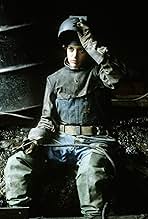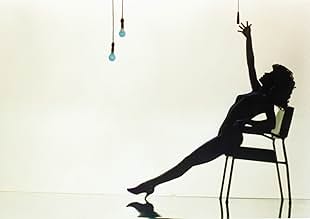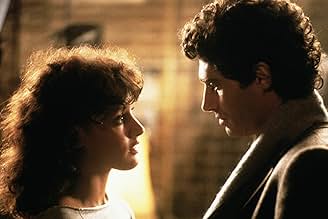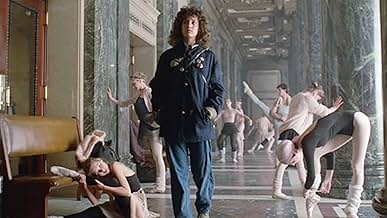Uma mulher de Pittsburgh com dois empregos - como soldadora e dançarina exótica - quer entrar em uma escola de balé.Uma mulher de Pittsburgh com dois empregos - como soldadora e dançarina exótica - quer entrar em uma escola de balé.Uma mulher de Pittsburgh com dois empregos - como soldadora e dançarina exótica - quer entrar em uma escola de balé.
- Direção
- Roteiristas
- Artistas
- Ganhou 1 Oscar
- 14 vitórias e 17 indicações no total
Philip Bruns
- Frank Szabo
- (as Phil Bruns)
Avaliações em destaque
Jennifer Beals stars as Alex Owens a welder by day and a dancer by night, who dreams of going to a ballet school. She really wants to make her dreams reality but is to nervous to audition. With a little encouragement and help from her good friend Hannah Long (Lilia Skala.) and her boyfriend/boss, Nick Hurley. (Michael Nouri.) she finally does audition. And, what an audition it was. The dance sequence at the end was brilliant. Flashdance is a great film full of fun music, (Including Irene Cara's hit song, "Flashdance, What a feeling".) great dancing and just lots of fun. Flashdance is an instant classic. I give it a 10/10.
In recent years there have been a number of British films based on the theme of working-class people who find fulfilment through their cultural activities; examples being Educating Rita (the first and most distinguished), Brassed Off, The Full Monty and Billy Elliott. Such films are frequently described as `quintessentially British' or `something that we can do and Hollywood can't', whereas the truth is that twenty years ago Hollywood was indeed making very similar films, mostly centred upon dancing, such as Saturday Night Fever, Dirty Dancing or Flashdance. Whereas these American films may not have had the covert (or, in the case of Brassed Off, highly overt) political message of their British counterparts, they nevertheless concentrated on differences in social class far more than Hollywood movies usually do.
The heroine of Flashdance, Alex, is a young woman who works as a welder and whose main joy in life is dancing. She moonlights as a dancer in a local nightclub, but her great ambition in life is to become a ballet dancer. The film tells the story of how she achieves that ambition, as well as the story of her romance with a wealthy middle-class divorcee, set against frequent dance sequences as Alex and her ice-skating friend Jeanie go through their paces. The climax comes with a scene in which she auditions for a place at a prestigious ballet academy and treats the judging committee to a bravura display of breakdancing. (Would a ballet school really be prepared to offer a place to a candidate whose dance skills owe more to the disco than to Swan Lake and who seems completely ignorant of balletic idiom?)
The film has its weak points. Although the plot is not as non-existent as some reviewers have felt, it nevertheless tends to take second place to the showpiece dance numbers; at times, it felt as if I were watching an extended series of pop videos. Potentially interesting themes are ignored; for example, Alex is a practising Catholic, but this seems to be a plot device to enable scenes set in the confessional to be used as soliloquies in which she can air her emotional problems. No attempt is made to explore the possible conflict between the demands of her religion and her sexually provocative dancing or her love for a divorcee.
The acting is undistinguished; Jennifer Beals makes an attractive and personable heroine, but it is clear why, despite the success of this film, she did not go on to become a major star. Her acting is too weak to enable her to carry a film; certainly I felt that she would be out of her depth in one that depends more upon plot and less upon song and dance. The other characters are little more than ciphers, with the exception of Hanna, the old lady who acts as Alex's mentor. I could certainly have done without the tasteless ethnic jokes told by Alex's comedian friend.
Yet, despite its faults, I enjoyed this film. Its redeeming feature is the zest and energy of its dance sequences, set to some well-chosen music such as Laura Branigan's Gloria or Irene Cara's title song. It may not be deep or significant, but it is an enjoyable, well-made piece of popular entertainment. 6/10.
The heroine of Flashdance, Alex, is a young woman who works as a welder and whose main joy in life is dancing. She moonlights as a dancer in a local nightclub, but her great ambition in life is to become a ballet dancer. The film tells the story of how she achieves that ambition, as well as the story of her romance with a wealthy middle-class divorcee, set against frequent dance sequences as Alex and her ice-skating friend Jeanie go through their paces. The climax comes with a scene in which she auditions for a place at a prestigious ballet academy and treats the judging committee to a bravura display of breakdancing. (Would a ballet school really be prepared to offer a place to a candidate whose dance skills owe more to the disco than to Swan Lake and who seems completely ignorant of balletic idiom?)
The film has its weak points. Although the plot is not as non-existent as some reviewers have felt, it nevertheless tends to take second place to the showpiece dance numbers; at times, it felt as if I were watching an extended series of pop videos. Potentially interesting themes are ignored; for example, Alex is a practising Catholic, but this seems to be a plot device to enable scenes set in the confessional to be used as soliloquies in which she can air her emotional problems. No attempt is made to explore the possible conflict between the demands of her religion and her sexually provocative dancing or her love for a divorcee.
The acting is undistinguished; Jennifer Beals makes an attractive and personable heroine, but it is clear why, despite the success of this film, she did not go on to become a major star. Her acting is too weak to enable her to carry a film; certainly I felt that she would be out of her depth in one that depends more upon plot and less upon song and dance. The other characters are little more than ciphers, with the exception of Hanna, the old lady who acts as Alex's mentor. I could certainly have done without the tasteless ethnic jokes told by Alex's comedian friend.
Yet, despite its faults, I enjoyed this film. Its redeeming feature is the zest and energy of its dance sequences, set to some well-chosen music such as Laura Branigan's Gloria or Irene Cara's title song. It may not be deep or significant, but it is an enjoyable, well-made piece of popular entertainment. 6/10.
There are already many comments on this film in the IMDb database, and I had no intention of writing another until to my surprise I noticed that it was frequently being replayed on several different local TV channels. Flashdance is a very outdated movie that has never appealed to most film critics, so I felt this was sufficiently unusual to justify an attempted explanation.
Since the DVD of Flashdance was released, it has appeared for hire in many small local convenience stores and service stations that only maintain a very small rack of films for hire Clearly although it is now very much of a period movie, it continues to retain an enormous appeal for many of those who have seen it before. Personally I have watched our tape of Flashdance more often than most of the other tapes we have at home. This is not because it would be my first choice, but because it is a film that my wife loves to watch again and again; whilst I find I can view it repeatedly more readily than many of her other favorite tapes, so when we are discussing what to view and have rejected a number of other possibilities we tend to turn back to Flashdance. This reinforces the comments already made in your database about Flashdance being a "feel good" movie for which most people seem able to ignore the faults and just enjoy the music, the dancing and the romance. (It also features "Grunt", a very appealing dog, who remains one of the reasons why my wife is always ready to rewatch this film.) As a film Flashdance is therefore something of a paradox. Originally the final product was not very highly regarded by the studio and only received a limited release. This was severely panned by most of the critics, and not surprisingly the film initially received very little support from the public. The reviews and the low attendance led to plans to withdraw it from circulation early, but before these were implemented the audiences started to grow and continued to increase until cinemas showing the film were mostly packed out. Clearly those few who saw the film at an early showing started telling their friends to ignore the critics and see it. This escalated exponentially until the film finished up as a major hit. In commenting on this film it would be equally invalid to ignore the very real concerns of the critics or the equally real appeal it had, and still seems to have, for most of the public.
The story is trite - a female welder in a steelworks dreams of being a ballet dancer and practices her dancing in one of the local bars at night. Here she meets and starts to fall in love with her fairly young divorced boss. With his support she is able obtain an audition with a major dance company who are essentially only interested in her dance training, and lose any interest they may have had when she says she has never attended a dance school. However she proceeds to audition for the very bored selection committee and gives an electrifying free dance performance that in true fairy story tradition brings the committee to its feet. Some critics have complained that doubles replaced the star Jennifer Beals for this sequence, but this is surely not important - the real question is how effectively the film plays, and this sequence has rightly been very widely admired. About the time the film was released, modern dance companies were being formed alongside traditional ballet companies in many major cities in North America and this sequence certainly added to the appeal of the film at the time, but it is decidedly not the only reason for watching it.
I could spend pages criticizing the screenplay in several different respects, but other comments in your database have already done this, and these criticisms are ultimately not damming. The important thing is that the film maintains an ongoing flow which sweeps most viewers along and earns it a place as one of the finer musical comedies to have been released in the past quarter century. The object of a film is to entertain the public and in ranking Flashdance I feel I must base my rating on its undeniable success in doing just this. So 7 out of 10.
Since the DVD of Flashdance was released, it has appeared for hire in many small local convenience stores and service stations that only maintain a very small rack of films for hire Clearly although it is now very much of a period movie, it continues to retain an enormous appeal for many of those who have seen it before. Personally I have watched our tape of Flashdance more often than most of the other tapes we have at home. This is not because it would be my first choice, but because it is a film that my wife loves to watch again and again; whilst I find I can view it repeatedly more readily than many of her other favorite tapes, so when we are discussing what to view and have rejected a number of other possibilities we tend to turn back to Flashdance. This reinforces the comments already made in your database about Flashdance being a "feel good" movie for which most people seem able to ignore the faults and just enjoy the music, the dancing and the romance. (It also features "Grunt", a very appealing dog, who remains one of the reasons why my wife is always ready to rewatch this film.) As a film Flashdance is therefore something of a paradox. Originally the final product was not very highly regarded by the studio and only received a limited release. This was severely panned by most of the critics, and not surprisingly the film initially received very little support from the public. The reviews and the low attendance led to plans to withdraw it from circulation early, but before these were implemented the audiences started to grow and continued to increase until cinemas showing the film were mostly packed out. Clearly those few who saw the film at an early showing started telling their friends to ignore the critics and see it. This escalated exponentially until the film finished up as a major hit. In commenting on this film it would be equally invalid to ignore the very real concerns of the critics or the equally real appeal it had, and still seems to have, for most of the public.
The story is trite - a female welder in a steelworks dreams of being a ballet dancer and practices her dancing in one of the local bars at night. Here she meets and starts to fall in love with her fairly young divorced boss. With his support she is able obtain an audition with a major dance company who are essentially only interested in her dance training, and lose any interest they may have had when she says she has never attended a dance school. However she proceeds to audition for the very bored selection committee and gives an electrifying free dance performance that in true fairy story tradition brings the committee to its feet. Some critics have complained that doubles replaced the star Jennifer Beals for this sequence, but this is surely not important - the real question is how effectively the film plays, and this sequence has rightly been very widely admired. About the time the film was released, modern dance companies were being formed alongside traditional ballet companies in many major cities in North America and this sequence certainly added to the appeal of the film at the time, but it is decidedly not the only reason for watching it.
I could spend pages criticizing the screenplay in several different respects, but other comments in your database have already done this, and these criticisms are ultimately not damming. The important thing is that the film maintains an ongoing flow which sweeps most viewers along and earns it a place as one of the finer musical comedies to have been released in the past quarter century. The object of a film is to entertain the public and in ranking Flashdance I feel I must base my rating on its undeniable success in doing just this. So 7 out of 10.
Sure, Flashdance will never make the AFI's Top 100, but it has an infectious charm. Jennifer Beals is really only so-so in the leading role, and her leading man Michael Nouri is no better off, but it doesn't matter. What does matter here is the great music! Really, the whole film is played like a 90-minute ad for MTV! Laugh at the dopey plot and listen to the great tunes. Great film to earmark the 80s.
As other users have said this film is very dated, but not necessarily bad. It was looked upon as a bit of fluff that was very successful in the box office. So now, it would come across as nostalgic (in the same vein as Dirty Dancing). But the thing I do like about it, is just that. Adrian Lyne perfectly captured the time, a post disco era when Break-dancing and Synth Pop were all the rage - Who could forget the FANTASTIC theme song, sung by Irene Cara (Fame) and composed by Synth Pop genius Giorgio Moroder (I feel love - Donna Summer among many others). So what if Jennifer Beals wasn't a great actress? So what if it wasn't her dancing? (Think one of them was a break dancer from "The Rock Steady Crew" - see? All about the era!) she was a good looking girl, and this was a harmless bit of fun at the time.
Você sabia?
- CuriosidadesJennifer Beals' trend-setting collarless sweatshirt came about by accident. The sweatshirt, which Beals brought from home, had shrunk in the wash and she had to cut the collar off in order to get it over her head. When director Adrian Lyne and costume designer Michael Kaplan saw it at the wardrobe fitting, they both loved it and Kaplan improved the overall look of the sweatshirt for the shoot.
- Erros de gravaçãoIn the climactic dance, Alex is played by several noticeably different people.
- ConexõesFeatured in Irene Cara: Flashdance... What a Feeling (1983)
- Trilhas sonorasImagination
Performed by Laura Branigan
Courtesy of Atlantic Records
Music by Michael Boddicker, Jerry Hey and Phil Ramone
Lyrics by Michael Sembello
Produced by Phil Ramone
Principais escolhas
Faça login para avaliar e ver a lista de recomendações personalizadas
- How long is Flashdance?Fornecido pela Alexa
Detalhes
- Data de lançamento
- País de origem
- Idioma
- Também conhecido como
- Electrodanza
- Locações de filme
- Empresas de produção
- Consulte mais créditos da empresa na IMDbPro
Bilheteria
- Orçamento
- US$ 7.500.000 (estimativa)
- Faturamento bruto nos EUA e Canadá
- US$ 92.921.203
- Fim de semana de estreia nos EUA e Canadá
- US$ 4.076.124
- 17 de abr. de 1983
- Faturamento bruto mundial
- US$ 92.921.203
- Tempo de duração
- 1 h 35 min(95 min)
- Cor
- Mixagem de som
- Proporção
- 1.85 : 1
Contribua para esta página
Sugerir uma alteração ou adicionar conteúdo ausente








































